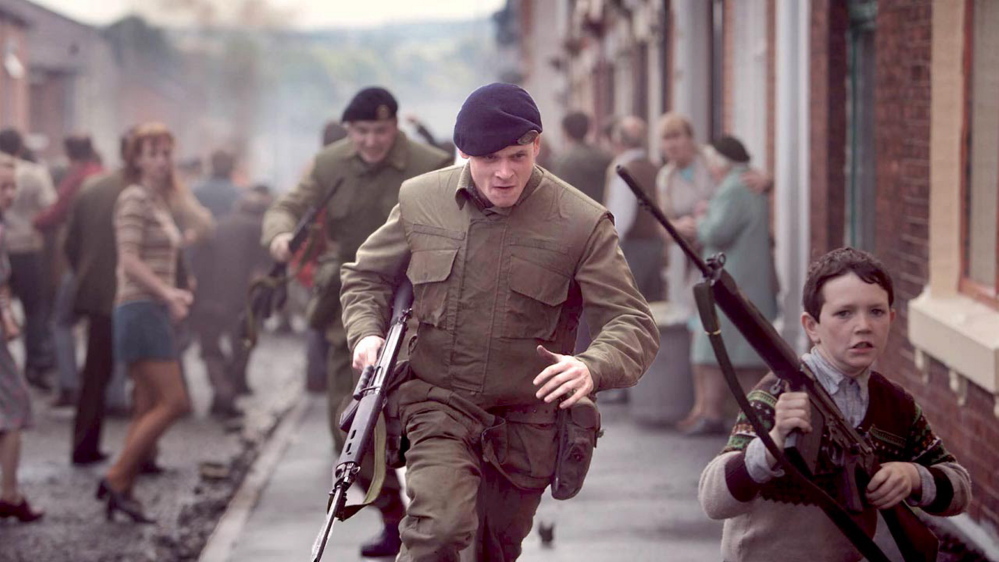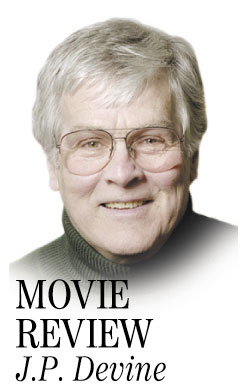Things fall apart; the centre cannot hold;
Mere anarchy is loosed upon the world,
The blood-dimmed tide is loosed, and everywhere
the ceremony of innocence is drowned.
W.B. Yeats
And no sooner is Pvt. Gary Hook out of the barracks, off the truck and into the valley of death that 1971 Belfast, Northern Ireland, had become, does the young British solider find his innocence in water deep. And before darkness falls, it’s gone and forever drowned.
1971 Belfast streets weren’t much different than W.B. Yeats’ grimy alleys of 1917, when the streets ran red with blood.
This is 1971, a year before Bloody Sunday set in the Bogside section of Derry, when British soldiers massacred 26 unarmed Northern Irish civilians during a protest. The soldiers involved were members of the last Battalion Parachute Regiment, and what a “Blood dimmed tide indeed was loosed.”
With no room here to run down through the bloody history of Ireland, all you need to know is that when the Irish say it’s over, it’s only begun.
Here we are some 54 years later, and another parachute regiment and our young hero, a British country boy from Derbyshire, are back in the streets of Belfast in the north of the Emerald Isle.
On a bad day, when the Protestants of one side of the city are killing Catholics on the other side and vice versa, the young soldiers are dumped in the middle of a neighborhood fight and asked to keep the peace.
Gary (Jack O’Connell) and his mates are surrounded and set upon by the locals. These are mostly the Catholics who hate the British, and over the wall, there are the Protestants who welcome them and want Northern Ireland to keep flying the Union Jack.
The squabble in the smoky and fire lit streets turns bloody, and Gary and his mate are separated from the others and beaten. Suddenly, an IRA gunmen steps up and puts a bullet in the eye of Gary’s mate. Gary runs for his life through streets he’s never known. He’s chased and shot at by a band of thugs who are intent on killing him. Clearly, they’re British-hating Catholics with nothing to do, now that mass and breakfast are over, but kill a Brit.
Those of us who are familiar with city chase films like Walter Hill’s 1979 chase thriller “The Warriors” know we’re in for a run.
The film seems at times to have been made for the very people who live on these mean streets, and not with much thought that it might be imported to America, let alone Maine. The cast is filled throughout with splendid actors unknown to American audiences who speak the dialect of working class Belfast and do it very well. That’s swell if you live down the block, but there are many scenes where subtitles might have come in handy.
What we see is an Irish Republican Army full of patriotic warriors, sprinkled throughout with brigands, liars, British undercover killers who mostly, out of necessity, whisper in the dark, cover their mouths when speaking, and are only understood when they’re shouting at one another.
It becomes clear, after a bit, that our hero Gary is in deep shamrocks and peat after he takes shelter in a pub and glimpses some shady characters in a back room making a bomb.
When that bomb accidentally goes off and the identities of all involved on both sides are threatened, it seems that everyone in the movie is out to kill our Gary. As the night grows darker, the streets fill up with gunmen looking for him.
Director Yann Demange gives us a chilling thriller and another view of the bad green blood that still flows through Ireland.
O’Connell (“Unbroken,” “Rise of an Empire”) has almost no dialogue here, just groans and grunts as he runs from one dark alley to another to stay alive. Along the way he is helped by a Protestant boy and almost murdered by a teenage Catholic.
Demange, a veteran of lots of television, looks like he may make the move to big screen land permanently. All those episodes of “Criminal Justice” seem to have taught him how to use shadows and breath holding long shots well. Gregory Burke’s screenplay is taut and spare.
Demange’s cinematographer, Tat Radcliffe, also a veteran of “Criminal Justice,” has an eye for action shots and spooky street corners.
There’s nothing new here in Demange’s piece, but wisely, he spares us too much political background noise and sticks to the facts and gives us a sort of Irish cowboy western formula: Young hero we like in danger, bad guys with guns looking for him. We also learn that British Armed Forces officials are not above sweeping damaging facts under the carpet. As we say here in the colonies, it’s not the deed that gets you in trouble, it’s the cover up.
J.P. Devine is a former stage and screen actor.
Send questions/comments to the editors.




Success. Please wait for the page to reload. If the page does not reload within 5 seconds, please refresh the page.
Enter your email and password to access comments.
Hi, to comment on stories you must . This profile is in addition to your subscription and website login.
Already have a commenting profile? .
Invalid username/password.
Please check your email to confirm and complete your registration.
Only subscribers are eligible to post comments. Please subscribe or login first for digital access. Here’s why.
Use the form below to reset your password. When you've submitted your account email, we will send an email with a reset code.